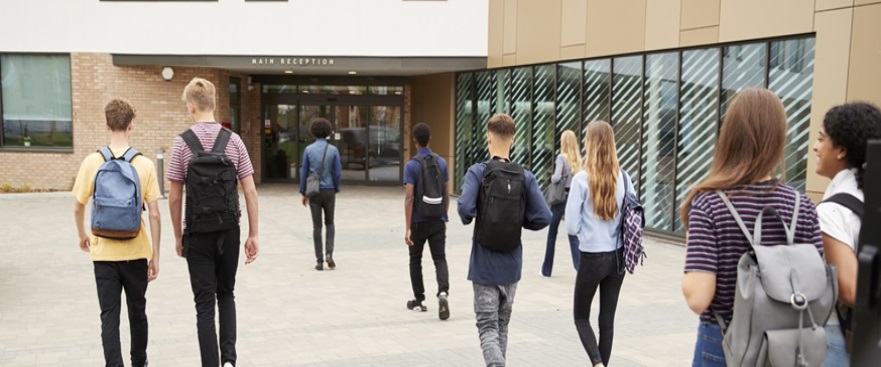
As allegations of sexual misconduct at school become increasingly common, Peter Csemiczky, partner in the Serious and General Crime department, sets out the basic principles any accused young person – or their parents – should consider.
+++++
It has become increasingly common for children of secondary school age to be accused of sexual misconduct, committed either at school or in an educational environment.
Hard numbers are hard to come by, but last year one campaign group recorded 59% of young women saying they experienced sexual harassment at school. At the time of writing over 51,000 accounts of school and university abuse have been published on the Everyone’s Invited website. At their most serious, these include allegations of rape.
Every allegation of sexual misconduct deserves to be taken seriously. Just as being the victim of a sexual assault is a traumatic experience with life-changing implications; so too it can be for anyone unjustly accused if the matter is not dealt with swiftly and appropriately.
It is in everybody’s best interests that these cases are investigated and assessed fairly, and that the children involved be treated with respect and sensitivity.
Below are some basic principles which any young person, their parents and carers, should bear in mind if they find themselves the subject of such an investigation.
1. Take it seriously
This may appear obvious, but it is important that everyone involved in any allegation of sexual misconduct takes the matter seriously. This is true no matter how outlandish, ‘out of character’ or ‘minor’ the allegations may at first appear to be.
All schools, whether they operate in the private or state sector, will have in place procedures for dealing with sexual misconduct. These usually oblige the school to swiftly investigate any allegation said to have taken place either on the school’s grounds or where the children concerned are under school care. Schools may also investigate alleged misconduct that takes place outside of school if it has the potential to bring the school into disrepute.
These procedures also oblige the school to inform the local authority, social services and in the most serious cases (i.e. when a criminal offence is alleged), the police.
The ramifications for an accused individual are serious. Investigations can be drawn-out affairs which demand time and focus. They can be emotionally draining. And of course, the consequences for the accused, and for the complainant, can be devastating.
2. Maintain an appropriate distance
Allegations of sexual misconduct are normally made by someone the accused person knows: a classmate, friend or peer.
Any parent whose child has been accused of sexual misconduct may be tempted to protest their loved one’s innocence to this individual, their friends or relatives. While this is an understandable reaction, it is vital not to make any contact with a complainant, their family or close friends.
Anyone whose loved one is involved in an allegation of sexual misconduct is best advised not to talk to, phone, email or in any way contact anyone connected to the complainant. Any such contact if perceived as an attempt to interfere with an investigation could cause more harm than good. In some circumstances it may amount to a criminal offence in its own right.
3. Beware social media
Schools, the police and social services are all obliged to ensure they do not publicly identify either complainants or accused individuals. The criminal courts also grant life-long anonymity to complainants in sexual offences, and – with rare exception – to any prosecuted child (defined as someone aged under 18 at the time of the offence).
But while these restrictions are generally effective in preventing the established media from identifying affected individuals, the rules do not apply to the playground.
There is little one can do about playground gossip. But anyone involved in an investigation into sexual misconduct at school is advised to stay away from social media. They should close their social media channels and switch off, as far as is possible, their mobile phones. They should advise their friends to do likewise. Online posts and messages that are designed to be ‘helpful’ or ‘supportive’ may not have the positive impact their author intended.
This may be difficult advice to hear for teenagers used to leading much of their lives online, and withdrawing from social media won’t stop the rumours, but remaining above the fray is a wise first response, at least in the first instance. It also enables all concerned to focus on what should be of primary concern: the official investigation(s).
4. Know how school investigations work
School investigations into allegations of sexual misconduct can vary in size, scope and rigour.
These differences – and the fact that the same school may do things differently depending on the nature of the allegation – mean it is difficult to give specific advice in how to engage with a school investigation.
However, there are some broad principles that parents of any child caught up in situation should know:
- School investigations are usually carried out internally by a member of school staff. This individual may, or may not, have special training and skills. Some school investigations into allegations of sexual misconduct will fall a long way short of objective rigour.
- Some schools may provide the accused pupil with a named staff member who is intended to assist the child. This person may, or may not, be appropriately independent.
- Evidence provided to a school as part of its investigation may not remain there. School investigations can run alongside investigations carried out by police and/or social services. Something said to one investigator may be passed to another.
- Evidence provided to a school investigation (for example an explanation of the disputed interaction) should be accurate and demonstrably so. An explanation that is given in haste without considering all the contextual material may be undermined later if further evidence comes to light.
- While it is important to co-operate with any school investigation, parents should seek to accompany their children to any school meeting. It may also be appropriate to bring a lawyer.
5. Prioritise any police investigation
Most schools will refer any allegation of serious sexual assault to the police. Anyone in this situation should be aware of the important differences between police investigations and those carried out by schools. The immediate concern may be with the school but a police investigation has far more serious consequences.
Unlike in most school investigations, a child who is questioned by the police must be assisted in their interview by an appropriate adult. This is often a parent. The child will also have to right to a lawyer being present with them at the police station when interviewed and of course the right to silence.
Police investigations must adhere to strict evidential standards, including the criminal standard of proof. Schools do not have the same rules.
If contacted by the police as to an allegation a parent is usually best advised to agree in principle to their child attending a voluntary interview outside school hours. Doing so may avoid the necessity of the child being arrested.
No one should be interviewed by the police without first having taken legal advice.
Finally: consider your child’s welfare
Any child who has been unfairly accused of sexual misconduct at school, and faces the prospect of investigation, is likely to be stressed and scared. Some struggle to recover from being the subject of an investigation even after they have been fully exonerated.
While parents are of course the most important source of emotional support, children may well benefit from talking to a trusted person who is outside the family. This may be a professional with experience of dealing with these matters.
Being accused of sexual misconduct can be a deeply traumatic and stressful experience, with the potential – if not handled correctly – to derail a young person at one of the most vulnerable points in their life.
Anyone whose child faces the prospect of such an investigation is advised to obtain early, pragmatic legal advice designed to bring it to a swift and satisfactory conclusion.



